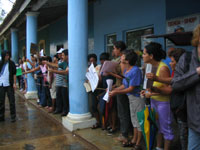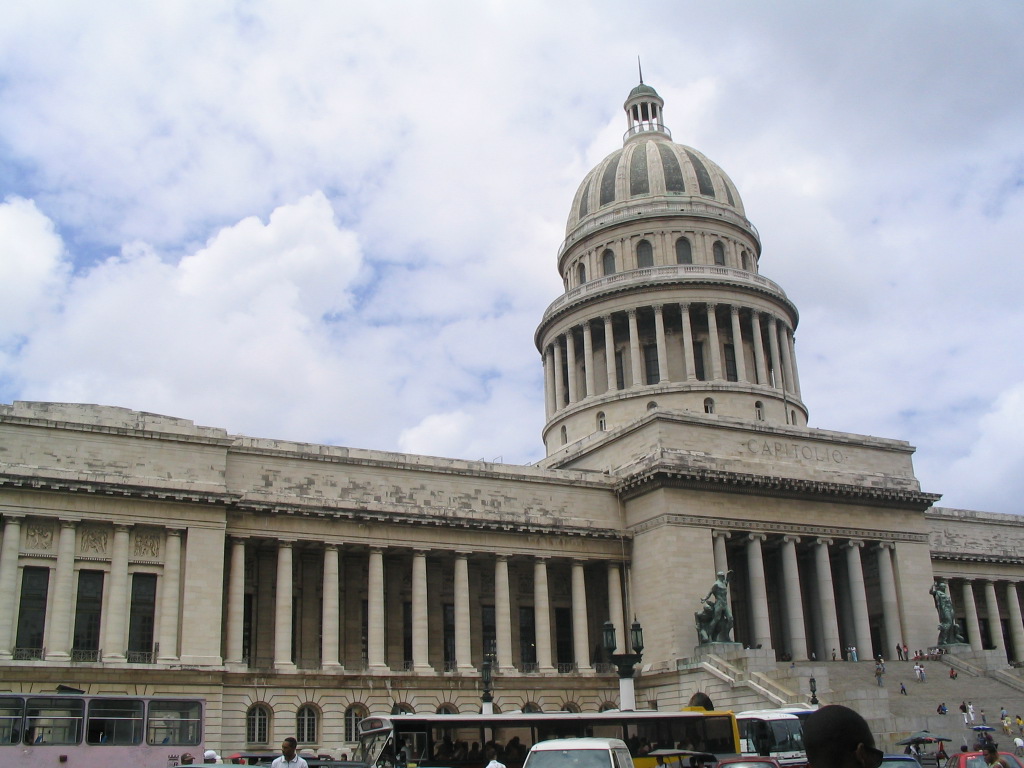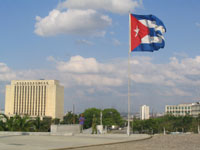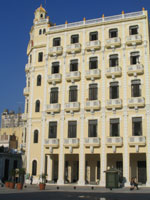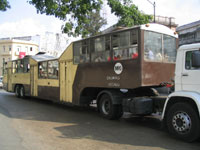Hotel Havana Libre, Tuesday April 5, 2005, 6:24 pm
So Saturday I had already planned to go to Vinales, a beautiful area in the province of Pinar del Rio, 190 km west of Havana. I took the Viazul bus from the Havana station, which is a modern bus network more or less for tourists and the one way fare is US$12 (way too much for the locals, most of whom end up taking local taxis or the cheaper and less reliable, more decrepit Astro bus system).
A young Cuban man sat down beside me in the bus terminal and tried to offer me accommodation in his private home in Pinar del Rio (one version of the shadow economy which is centered around tourists).
After I told him I already had accommodation, he started to talk to me about life in Cuba and how hard it is and that is extremely difficult to survive economically. He told me he only makes US$24 a month, working for the national(ized) telecommunications company. He also said that recently financial transfers from Cuban emigrants, particularly from Miami, have been cut back to US$100, which works out to CUC 92 (Cuban Convertible Pesos, which used to be 1:1 with the US Dollar) and that soon US$100 would work out to even 8% less. He basically just spilled over with unhappiness about the economic situation.
The trip to Vinales was about 3.25 hours long and along the way it started to rain. Vinales is known for its beautiful limestone formations, the “Mogotes”, box-like mountains that grow straight out of a flat valley floor with often vertical walls and hundreds of limestone caves.
Probably 30 or 40 people were waiting at the bus stop in Vinales, all owners of private bed and breakfasts (or “casas particulares”) ready to pick up tourists staying with them. My hostess, Sandra, a beautiful young woman of 28 years, was there too with a sign saying¨”Susanne – Canada” on it. It’s a strange feeling arriving in a foreign country, in a strange town, not knowing anybody, and seeing your name printed on a sign first thing you arrive.
My hostess took me to their Casa Particular, a simple colonial 2 bedroom house, with a brand-new bathroom for the guests, and an old decrepit bathroom (without sink or toilet seat) for the owners. My hostess had to work and I was very tired, and it was raining anyway, so I slept for a few hours until I received my home-cooked dinner directly in the private house.
In a conversation with the young woman I found out that she makes the equivalent of US$13 per month (and a simple pair of Jeans costs US$20!), so she supplements her income with the bed and breakfast (another one of the few private types of business allowed). The night cost me US$20.00 and the dinner with drink was US$10.00 for a complete dinner with chicken, arroz congri (rice with black beans) and salad. The food was very simple and not particularly spicy or tasty.
We had a fascinating conversation and I found out that women today, despite economic hardships, have it a lot better since the revoluation. Cuba is a traditionally a country with a lot of machismo, and the revolution has done a lot for women. They now receive educational opportunities and can obtain education and work which was very difficult before. Many of the educated women work in ministries or universities and have a fairly decent standard of living.
I received a few explanations about the relations between men and women in Cuba (e.g. that modern educated women no longer accpet those machista attitudes of Cuban men, but that there are still many traditional young women without self-esteem or education that are more or less at the mercy of their boyfriends/husbands).
I also found out that it is not allowed for a private bed and breakfast owner to employ a maid (due to their exploitation in the past), but that everybody does it anyway, since people have to work full-time to make a living and don´t have time to manage the day-to-day chores of running a small hospitality establishment in addition to working outside the house.
My hostess’ common-law boyfriend told me about the medical system in Cuba, that he had a benign tumor in his tibia (after having been a national calibre rower and basketball player) and that he received an implant in his leg consisting of coral, from 2 of the most well-respected doctors in Cuba. His operation was based on new surgical techniques from the US and since the operation his life is almost normal, he walks completely normally, except he can no longer run or play basketball.
All Cubans I have met so far are extremely proud of their country’s achievements in public medicine, public education, literacy and opportunities for women and minorities (while at the same time some of them are quite vocal about all the economic hardships and other restrictions imposed by the government).
Definitely some interesting insights….
